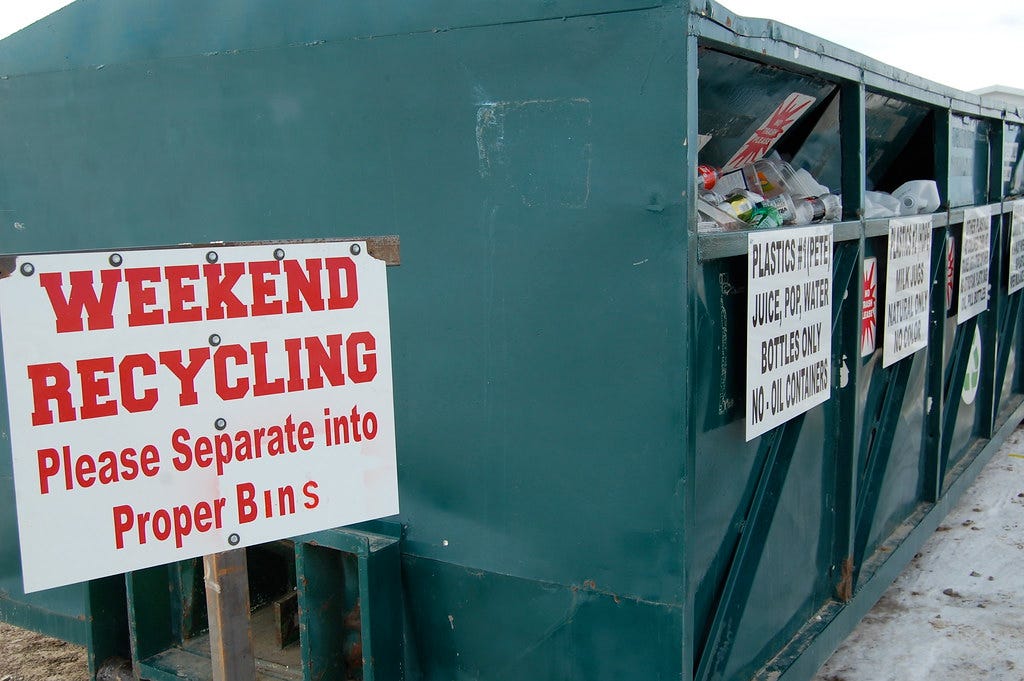Recycling isn't working. Oregon can help change that.
As lawmakers make it easier to recycle more, we all must do our own duty of diligently sorting. It’ll make things easier for recyclers and the planet.
Ever since China imposed stricter restrictions on the materials it recycles in 2018 and 2019, the rest of the world hasn’t figured out what to do with their mountains of recycled products. That little recyclable triangle sign on many products is no longer a reliable indicator. The fact is many of the goods you think you can recycle aren’t actually recycled because many states in the US don’t have the appropriate reprocessing facilities. Instead, a daunting amount of these recyclable products are either put in a landfill or, worse, incinerated—which releases nearly 15 times more carbon dioxide than landfills.
As people began to recycle non-recyclable materials, China and other Asian countries raised their standards to cut down on receiving such costly materials meant for other facilities. When recycling plants receive such materials, they face high costs in figuring out what to do with those materials. For instance, when a recycling facility receives a pizza box, it can slow the process down since workers have to sort and pick out the greasy box and discard it.
When everybody starts recycling their pizza boxes, then these workers may become overwhelmed with sorting demands. Other commonly recycled but non-recyclable goods include day-to-day items such as containers with food residue, and even certain kinds of wrapping paper. As a consumer, I would love to see my old worn-out clothes be recycled and repurposed, but when I put that unrecyclable product in the recycle bin, it just adds an extra layer of work for recycling facilities that have to sort through thousands and millions of materials everyday.
It’s no small feat that the majority of the country has learned to recycle, and we shouldn’t put that knowledge to waste. Unfortunately, we’ve gotten worse and worse at sorting our trash and it’s making our recycling plants’ jobs so difficult that they end up tossing many repurposable materials.
But there is good news. For one, Oregon outpaces most other states when it comes to our ability to sort trash and to do so at scale. In 2021, the State Legislature passed the Recycling Modernization Act, which creates financial incentives for producers to make their packaging recyclable and environmentally friendlier. Previously, some producers would combine plastic and metal in their packaging, which makes sorting and recycling much harder. This law makes producers pay for a portion of the recycling cost, which means that they’re more likely to find alternative packaging options that make recycling easier. And if they don’t, well, they’re still subsidizing our recycling facilities. As a result, these facilities will have the means to invest in better processing and sorting, reducing the likelihood of them throwing away or burning materials.
Supply chain blunders have made it clear that we must have domestic solutions to major problems and processes. Our reliance on China to take our trash now threatens the planet and our recycling capacity. Thankfully, Oregon has taken a big step in making recycling a more reliable and sustainable effort. Laws that change business incentives, ban non-recyclable products such as styrofoam, and invest in more comprehensive recycling facilities will improve the situation and ought to receive attention from other states. Although, those laws won’t change everything alone.
At the end of the day, consumers decide what they buy, and what they recycle. Until the state increases the kinds of things we can recycle and repurpose, we must have clearer guidelines about what’s trash and what’s actually recyclable. Egg cartons? Milk cartons? These are some things that I only recently learned should not go in the recycling. As lawmakers make it easier to recycle more, we all must do our own duty of diligently sorting. It’ll make things easier for recyclers and the planet.
Jared is a Politics, Policy, Law and Ethics Major at Willamette University, aspiring to bring Oregon together to achieve more representative elections and a sustainable energy program to brag about.
Photo credit: "Weekend Recycling" by girlonaglide is licensed under CC BY-NC-SA 2.0





